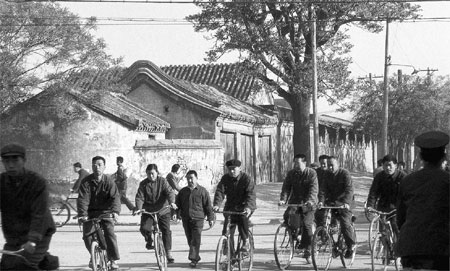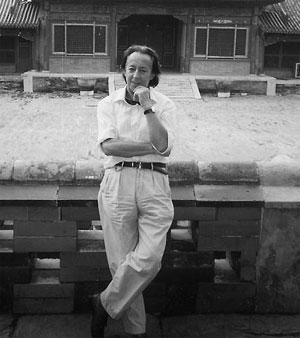Journalist-turned sinologist Adriano Madaro from Italy, believes he has "a fateful bond with China and the Chinese capital". "I always say to friends who ask me about China: It is better to see it once than hear about it a hundred times," he says.
"It has been many years since I chose this, out of all Chinese proverbs I know, as my reply, and added my own - China is a place to which one returns, rather than goes."
Dubbed the "Marco Polo" of modern times by local media, the 67-year-old has visited China about 160 times, engaging in several inter-cultural exchanges since 1976.
Early this year, Madaro's photo album, Beijing in the Eyes of an Italian Journalist, was published by the People's Press.
|

|
|
Scene of everyday life in a hutong of Beijing between 1976-77. [Adriano Madaro] |
Adding to a dozen books and albums he has produced about China, this 195-page photo album captures all the major changes that have occurred in the Chinese capital over the past three decades.
Currently, he is busy working on a new component of the Chinese Civilization exhibition series, a gigantic project running from 2003-2015.
Supported by numerous museums, historians and archaeologists with specialized knowledge of Chinese history, it "intends to give European viewers a glimpse of the splendor of dynastic China from the Qin (221-206 BC) to the Qing (1644-1911) periods", says Madaro.
The third series of the exhibition that will remain open from Oct 24, 2009 to May 9, 2010 at Treviso in northeast Italy, will showcase the revival of Chinese prosperity under the Ming emperors (1368-1644), including the ocean exploration of Admiral Zheng He.
"The seeds of my passion for China were sown when I received a small book on Marco Polo by my mother - a primary school teacher - when I was five or six years old," he recalls.
He lived in Oderzo, a village on the outskirts of Venice, hometown of Marco Polo, and China was far, far away.
During the Cold War years, for Madaro and his family "China, a wonderland visited seven centuries earlier by Marco Polo, was some kind of separate planet".
But a growing curiosity drove him to collect as much information as he could about China.
He resolutely copied maps of China, inserting the names of rivers and cities, and cut out all the articles he could find about China from unsold newspapers that the son of an obliging newsagent gave him, thus starting an archive that he still has today.
"These articles were, however, almost all negative and hostile toward China," he recalls.
"I couldn't believe it and longed to visit the country."
At 15, when many of his peers did not even know where China was, he was reading translated works by Lu Xun and Lao She, renowned modern Chinese writers.
"It was through reading Lu Xun that I gained my first significant insight into the soul of China," recalls Madaro.
Through extensive reading, he discovered that at the same time as the Roman Empire a powerful Chinese Empire had existed with dynasties "comparable in its splendor and grandeur to our Renaissance".
Adriano chose to major in politics at the University of Venice and did a graduation thesis titled Political Doctrines on the Chinese Revolution.
After comparing different versions of books on Chinese history, he concluded that many recent history books written by Westerners were inaccurate owing to the influence of the Cold War mindset.
"If they were similar, they could be believed. If they were different, none of them was true," he says.
Madaro decided to get the truth about China by himself.
Soon after his graduation, Madaro made his first trip to China in 1976 as a member of an Italian journalist delegation.
The 22-year-old was amazed by what he saw.
"I was surprised to see that Chinese people were so happy, despite having little money in their pockets," he says.
Since then, he has come to China almost every year, visiting not only the big cities such as Beijing, Shanghai, and Guangdong but also the most far-flung and inaccessible regions, from Inner Mongolia to Tibet, from Heilongjiang to the island of Hainan.
Madaro is a rare eyewitness to the vast changes in Chinese urban life and the unwavering efforts to combat poverty in the rural areas.
Each time Madaro visited China, he would stay for at least 10 days and sometimes even for a month. And he would always have a camera in tow.
|

|
|
Adriano Madaro at an old temple in Beijing. [Courtesy of Adriano Madaro] |
Of all his impressions of China, he finds the changes in Beijing, the most remarkable. And among all the places he has visited, Madaro loves Beijing the best.
When he first arrived in Beijing, Madaro was deeply impressed by the labyrinthine hutongs, the ubiquitous bicycles on the streets, and the people dressed in plain blue suits.
Now he finds the roads full of cars, an expanding subway system and buildings shooting into the sky.
"Beijing is my city. Beijing is my other home," he says. "I don't know why but I feel safe and relaxed here."
However, he also feels bitter about the destruction of the vast old hutong areas and ancient buildings in the city in the 1990s.
"It has drastically changed the face of the city. Why could a new Beijing not be built around the old one? The value of history lies in such things," he asks.
Obsessed by Chinese history and culture, Adriano abandoned journalism in 1999 to devote himself fully to writing about Chinese history and promoting intercultural understanding.
So far, he has churned out many popular books on China, including Mao on the Front Page (1977), China, 700 years after Marco Polo (1980), Journey within China (1986), Welcome to China (1988), In the Great Unknown Country Beyond the Wall (1989) and The Boxer Rebellion (2001).
After the Ming Dynasty series, Madaro's next exhibitions will focus on the Qing Dynasty and on Tibet.
(China Daily April 22, 2009)